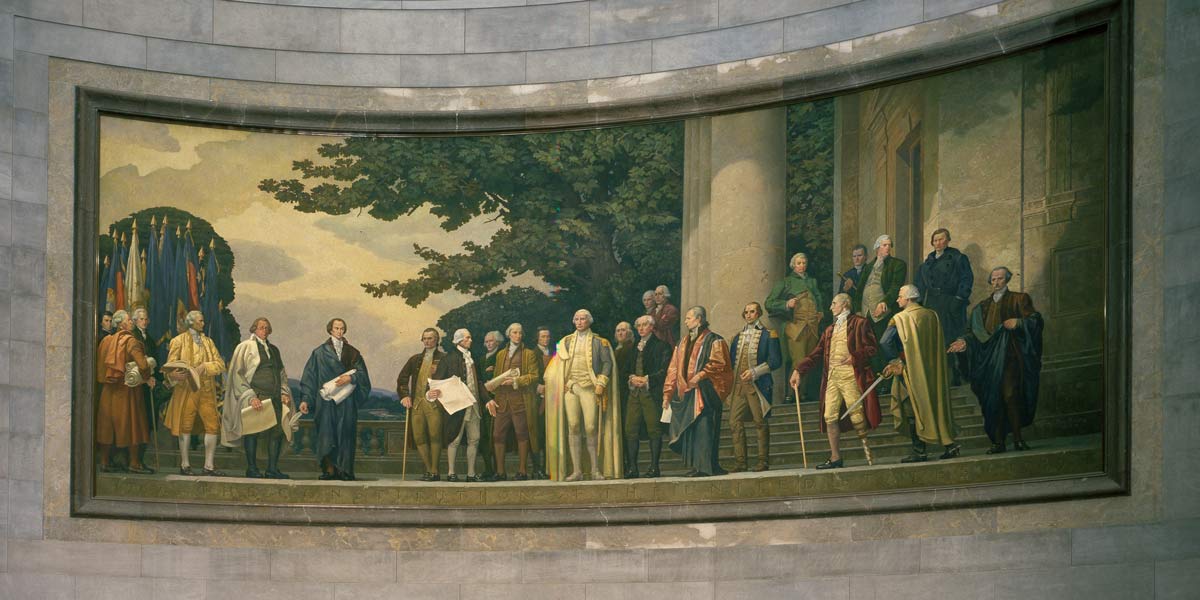
More Info
Barry Faulkner's 1936 "Constitution" mural in the rotunda of the National Archives, Washington, D.C.
Photograph in the Carol M. Highsmith Archive, Library of Congress, Prints and Photographs Division
Founders’ concern about fractured America relevant then, now
How are you celebrating the Fourth of July — with fireworks, a parade, a family cookout?
Try sharpening your news literacy skills! Our nation’s founders would be proud of you.
While they didn’t have to contend with the 24-hour news cycle, internet trolls or dangerous conspiracy theories, the Founding Fathers were concerned that misinformation and siloed thinking could weaken our young democracy.
In PoliticusUSA Tim Libretti, an Illinois university professor, wrote that the founders worries extended beyond meddling by foreign powers. They also were concerned about the vulnerability of the population to deceit and manipulation by their fellow citizens. However, the Founding Fathers put great stock in the people’s ability to make sound decisions based on facts that served the public good.
But John Adams had his doubts, Libretti noted. He feared that “human reason, and human conscience, … are not a match for human passions, human imaginations, and human enthusiasm.”
Factionalism, then and now
Adams wasn’t the only Founding Father with concerns. In America Magazine, a Jesuit publication, Matt Malone wrote that James Madison worried about factionalism, or the public breaking down into small, single-minded groups that act at the expense of the greater whole. And the Father of the Constitution provided an example: Tiny Rhode Island, which was beset by factionalism. “Madison believed that only a large society, occupying a vast expanse of space, could be effectively governed as a republic. If the place were too small, then like-minded people could too easily find one another and form a faction,” Malone wrote.
He quotes Madison as saying,“In the extended republic of the United States a coalition of a majority of the whole society could seldom take place on any other principles than those of justice and common good.”
Today, millions of Americans need not cram themselves into 1,200 square miles — the size of Rhode Island — to form a powerful and destabilizing faction. Thanks to the internet and social media they can just look at their phones.
With little effort, anyone can find groups of like-minded, passionate people whose beliefs are often based on misinformation and conspiracy theories, with QAnon being one of the most widespread and dangerous. Many adherents were among the rioters who stormed the U.S. Capitol on Jan. 6, 2021.
Education is the antidote
What can you do on July 4 to stand up for the Republic? Become more news-literate so you are not vulnerable to conspiracy theories and factionalism.
And put your faith in the power of education, as Thomas Jefferson did. “I think by far the most important bill in our whole code is that for the diffusion of knowledge among the people. No other sure foundation can be devised for the preservation of freedom, and happiness,” he wrote in 1786.
Of course, his idea of diffusion of knowledge excluded enslaved Africans and all women.
At NLP, we strongly believe that education is the most effective and equitable approach to developing a more news-literate public. Our society relies on people who can think critically, engage responsibly with information, value our democracy and participate in keeping it robust. That’s why we hope you’ll spend some time with our resources to sharpen your ability to recognize misinformation. And please share that knowledge with your family, friends and network.
Happy Fourth of July!
